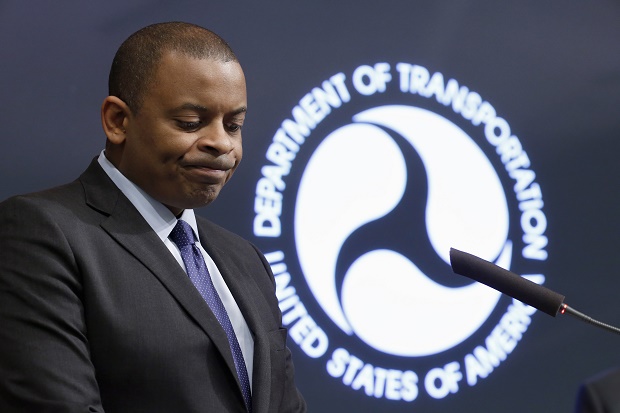Japanese company fined $70 million over exploding air bags

Transportation Secretary Anthony Foxx pauses during a news conference to discuss Takata air bags, Tuesday, Nov. 3, 2015, at the Transportation Department in Washington. U.S. auto safety regulators fined Takata Corp. of Japan $70 million for lapses in the way it handled recalls of millions of explosion-prone air bags that are responsible for eight deaths and more than 100 injuries worldwide. AP Photo
DETROIT, United States—U.S. auto safety regulators fined Japan’s Takata Corp. $70 million Tuesday for concealing evidence for years that its air bags are prone to explode with grisly consequences—a defect linked to eight deaths and more than 100 injuries worldwide.
Under an agreement with the government, Takata will phase out manufacture of air bag inflators that use ammonium nitrate, the propellant blamed for the explosions. It also agreed to a schedule over the next two years for replacing many of the devices already in use.
READ: Takata air bag recall doubles to nearly 34 million
And unless it can prove they are safe, Takata may have to recall all its inflators, even those not yet implicated in the mess.
The company admitted that it knew for years that the inflators were defective but that it fended off recalls by failing to tell the National Highway Traffic Safety Administration.
“Delay, misdirection and refusal to acknowledge the truth allowed a serious problem to become a massive crisis,” Transportation Secretary Anthony Foxx said.
READ: What you need to know about the Takata air bag recall
In a statement, Takata CEO Shigehisa Takada said the company regrets the circumstances that led to the NHTSA agreement and will work to develop a new generation of inflators. He said the settlement will “enable us to focus on rebuilding the trust of automakers, regulators and the driving public.”
Under the five-year pact, NHTSA can increase the penalty to a record $200 million if the company fails to abide by the terms.
The biggest fine ever handed out by NHTSA is the $105 million levied against Fiat Chrysler earlier this year for failing to report safety problems and follow through on 23 recalls.
Takata’s inflators can rupture and hurl shrapnel at drivers and passengers in a crash. So far, about 23.4 million driver’s-side and passenger-side inflators have been recalled on 19.2 million U.S. vehicles sold by 12 automakers.
NHTSA Administrator Mark Rosekind said Takata’s misconduct dates to at least 2009, when it failed to tell the agency about the problem. Automakers must notify NHTSA of defects within five days of discovering them.
Regulators said Takata also provided them with “selective, incomplete or inaccurate data” for years.
Honda, Takata’s biggest customer, essentially fired the supplier Tuesday. All of the air bag-related deaths reported so far have been in Honda vehicles.
Takata still faces hundreds of lawsuits and a federal criminal investigation.
“The penalty seems small compared to the consequences of the concealment and disregard” for the law, complained Sen. Richard Blumenthal, D-Conn., a frequent NHTSA and Takata critic.
Takata’s air bags are inflated by an explosion of ammonium nitrate, and investigators have found so far that prolonged exposure to airborne moisture can cause the propellant to burn too fast. That can blow apart a metal canister and shoot out fragments.
Most of those injured or killed lived in high-humidity states along the Gulf of Mexico. The injuries included severe neck cuts and facial injuries, as well as the loss of eyesight and hearing.
Still, Takata and government investigators have yet to discover the exact cause of the ruptures. With that in mind, the Transportation Department is giving Takata three to four years to prove that all of its inflators are safe or to identify the cause of the ruptures.
“Unless new evidence emerges, the company will have to recall all of its inflators,” even those in car models not implicated up to now, Foxx said. He said he was unsure how many air bags that would amount to.
Sen. Bill Nelson of Florida, where numerous air bag ruptures have been reported, said he is worried that Takata will be able to sell ammonium nitrate inflators until the end of 2018.
“We urgently need to redouble efforts to get the recalled vehicles fixed and get the old ammonium nitrate-based inflators out,” Nelson said.
The agreement also calls for the appointment of an independent monitor who will make sure Takata abides by its terms.